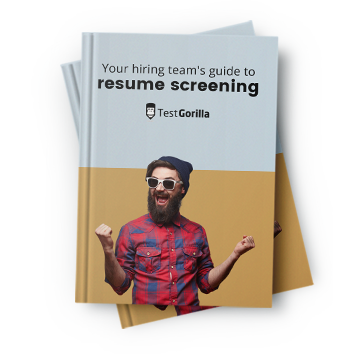Software development and other coding roles require a high level of proficiency in specific coding languages. It’s essential for your business to assess applicants’ coding abilities to ensure you’re hiring individuals with the appropriate skills for the position.
Tests to help you undertake a general coding assessment can be very useful and provide insights into an applicant’s proficiency in and working knowledge of the relevant coding languages.
In this guide, we take a closer look at three leading talent assessment tools to help you assess applicants’ general coding skills.
Table of contents
Top 3 talent assessment software for general coding assessment at a glance
Software provider | Best for | Features | Pros | Cons |
TestGorilla | Comprehensive language and framework-specific coding assessments | Dozens of coding tests, custom questions, tests available in 12 languages | Free forever plan, language and framework-specific assessments, mobile-friendly | No two-way video interviews |
CodeSignal | Companies that regularly need to assess coding skills | Role-specific evaluations, two-way video interviews, third-party integrations | Supports 70+ coding languages, user-friendly interface, anti-cheating measures | No ATS, no phone support, no soft skills assessments |
CodeAid | Companies requiring real-world coding assessments | Automatic coding assessment, plagiarism and anti-cheating tools, applicant result records, assessments based on working skills | Attractive free forever plan, option to cancel test invites, decent anti-cheating tools | Limited ATS integrations, no soft skills tests, no video interview features |
Top 3 talent assessment tools for general coding assessment
Here, we take a closer look at the top three talent assessment tools for general coding assessment. We expand on their main features, pros, cons, pricing, and more to help you make an informed decision.
1. TestGorilla
TestGorilla offers a powerful candidate screening platform backed by more than 300 scientifically validated tests. These include a range of general coding assessments, along with tests for specific languages or frameworks.
A few of the most popular coding tests include the Python (Coding): Entry-Level Algorithms test and the Javascript (Coding): Entry-Level Algorithms test. You will also find framework-specific tests such as Node.js, Gatsby.js, and more.
Tests are available in 12 languages, making it easier than ever to extend your search for the perfect applicant internationally. You can add up to five tests to a candidate assessment, which means you can easily assess an applicant’s proficiency in multiple programming languages.
You can also add custom questions to any test. These can include essay-style or multiple-choice questions or even requests for a short video response.
What’s more, TestGorilla makes it easy for you to compare all candidates. You can view each applicant’s overall score, as well as their score for each test and their responses to custom questions.
You can also annotate assessment reports, enabling effective collaboration between members of your hiring team.
One downside is that TestGorilla doesn’t have a native ATS. However, it supports integration with various third-party ATS platforms.
Best for:
Comprehensive language and framework-specific coding assessments
Features:
300+ tests
Available in 12 languages
Ability to add custom test questions
Up to five tests per assessment
Numerous coding and programming tests
Pros:
Feature-rich free forever plan
Customizable coding assessments
Anti-cheating tools ensure reliable results
Enables visual comparison of candidate scores
Third-party ATS integrations are available
Mobile-friendly assessments
Cons:
No two-way video interviews
ATS is absent
Pricing:
Free forever at $0 - 10 free tests, including all personality tests.
Depending on the size of your company, paid plans begin with:
Starter from $75 USD per month ($900 per year paid upfront) - start with skills-based hiring for all roles. There is also the option to pay monthly, starting from $85 USD per month.
Pro from $115 USD per month ($1,380 per year paid upfront) - maximize your hiring with advanced features. There is also the option to pay monthly, starting from $130 USD per month.
Verdict:
TestGorilla offers powerful talent assessment tests that enable you to assess the general coding skills of applicants. You can combine up to five tests in a single assessment, enabling you to evaluate a variety of skills at once.
What’s more, TestGorilla is super easy to use, affordable, and supports custom questions and responses. Plus, it makes it straightforward for you to compare applicants’ results and profiles.
There’s even a free forever plan that enables you to create unlimited assessments using its 10 free tests. If you’re looking for a platform to help you perform pre-employment general coding assessments, TestGorilla has you covered.
2. CodeSignal
CodeSignal is a popular cloud-based platform that’s designed to help hiring managers and recruiters assess applicants’ technical skills.
With CodeSignal, you can build custom tests for more than 70 languages based on questions created by industry experts, and you can install any frameworks or applications required for your assessments.
CodeSignal uses a three-step applicant evaluation process, starting with prescreening. This is designed to filter out the top talent from large pools of applicants, such as university graduates. There are multiple plagiarism checks and anti-cheating tools to help prevent fake applications.
Applicants who pass prescreening progress to the technical skills tests, which can be customized to fit the requirements of your position. These generally have more detail and are more specialized than the prescreening assessments.
The results can be used to help you rank candidates and identify applicants for interviewing. The interview can also be completed through the CodeSignal platform, which includes a two-way video feature.
The main downside of CodeSignal is its limited breadth of tests. There’s no way of evaluating soft skills such as communication or writing. The platform focuses solely on coding assessment.
Best for:
Companies that regularly need to assess coding skills
Features:
Role-specific evaluations
Two-way video interviewing
A selection of third-party integrations
Shareable coding reports
Keystroke tracking and replay
Pros:
User-friendly interface
Tests for 70+ coding languages
Decent anti-cheating tools
Cons:
Focuses solely on coding and similar skills tests
Lack of transparent pricing
No ATS
No customer service by phone
Pricing:
Custom pricing: Contact the sales team for a quote
Verdict:
CodeSignal is a popular general coding assessment tool enabling you to build custom assessments in over 70 coding languages. You can base your test on thousands of questions that have been created by qualified professionals.
On the downside, CodeSignal’s lack of soft skills tests is a major absence. This can make it difficult to assess an applicant’s collaboration or communication skills, for example. Overall, though, CodeSignal is an option worth considering if you need to perform regular code-heavy applicant screening.
3. CodeAid
CodeAid offers a Git-based testing platform that’s designed to help you assess applicants’ coding and technical skills. It aims to replicate real-life workflows during applicant testing and provide you with the most accurate screening possible.
Its tests can be used to assess various knowledge areas, including problem-solving, web API creation, front-end development, architecture design, and more. Plus, you can choose the most appropriate tests for your open position.
Once an applicant has completed a test, CodeAid provides an overall score alongside a breakdown of the candidate’s rating. There’s a built-in plagiarism checker, and you can take advantage of advanced tools like the “feedback and fix” functionality to further assess candidates’ skills.
On the downside, CodeAid is limited to technical skills testing and offers no soft skills tests. It also lacks the ability to create custom questions or accept video responses.
Best for:
Companies requiring real-world coding tests
Features:
Basic ATS
Integrated anti-cheating measures
Accessible records of applicant results
Assessments based on real-world situations
Pros:
Attractive free-forever plan
Easily cancel applicant invites
Effective anti-cheating tools
Cons:
Few ATS integrations
No soft skills testing
No video interview features
Pricing:
Free at $0 (two users and five candidate invites per month)
Team at $99 per month (five users and 200 candidate invites per month)
Enterprise from $399 per month (unlimited users and unlimited candidate invites per month)
Verdict:
CodeAid offers comprehensive candidate testing based on real-world coding challenges. However, it lacks any soft skills assessments and is only useful for testing technical and coding skills.
On the plus side, a free forever plan lets you test the platform, and it boasts attractive plagiarism-checking and anti-cheating tools. It’s definitely worth a try, but the lack of soft skills tests will be a deal-breaker for many.
Conclusion: Our top choice
CodeSignal and CodeAid are attractive options, but TestGorilla stands out as the leading talent assessment tool for general coding assessment.
It offers numerous coding tests that you can put together to form a candidate assessment, and the platform supports 12 languages to help you streamline international hiring.
There are also tests for soft skills, and you can easily view and rank applicant results. TestGorilla provides transparent pricing, and there’s even a free forever plan with basic tests, including all of the personality tests.
Overall, it’s an excellent option that we’d suggest trying if you need high-quality, accurate applicant screening software for coding and other skills assessments.
Disclaimer: The information on TestGorilla competitors has been taken from the relevant competitor website and is accurate at the date of publication.
Related posts
Hire the best candidates with TestGorilla.
Create pre-employment assessments in minutes to screen candidates, save time, and hire the best talent.
Latest posts
The best advice in pre-employment testing, in your inbox.
No spam. Unsubscribe at any time.

Hire the best. No bias. No stress.
Our screening tests identify the best candidates and make your hiring decisions faster, easier, and bias-free.
Free resources
Anti-cheating checklist
This checklist covers key features you should look for when choosing a skills testing platform
Onboarding checklist
This resource will help you develop an onboarding checklist for new hires.
How to find candidates with strong attention to detail
How to assess your candidates' attention to detail.
How to get HR certified
Learn how to get human resources certified through HRCI or SHRM.
Improve quality of hire
Learn how you can improve the level of talent at your company.
Case study: How CapitalT reduces hiring bias
Learn how CapitalT reduced hiring bias with online skills assessments.
Resume screening guide
Learn how to make the resume process more efficient and more effective.
Important recruitment metrics
Improve your hiring strategy with these 7 critical recruitment metrics.
Case study: How Sukhi reduces shortlisting time
Learn how Sukhi decreased time spent reviewing resumes by 83%!
12 pre-employment testing hacks
Hire more efficiently with these hacks that 99% of recruiters aren't using.
The benefits of diversity
Make a business case for diversity and inclusion initiatives with this data.
























